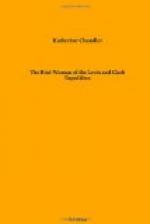The party went down the Columbia River in canoes.
It was a hard trip.
It rained all the time.
Each day the men were wet to the skin.
They had to carry their goods around some rapids.
They could not be very cheerful.
One day it stopped raining for a little time.
The low clouds went away.
The party saw that the river was very wide.
They rowed on.
Then they saw the great ocean lying in the sun.
They became very happy.
They cheered and laughed and sang.
They rowed on very fast.
Captain Lewis wrote in his book:
“Ocean in view! O! the joy! We are
in view of the Ocean, this great
Pacific Ocean, which we have been so long anxious
to see. The noise made
by the waves breaking on the rocky shores may be heard
distinctly.”
half for got jour ney troub les
THE PACIFIC OCEAN.
The party saw that they had come to the end of their
journey.
They had come 4,134 miles from the mouth of the Missouri
River.
It had taken them a year and a half to come.
But now they forgot their troubles.
They forgot the times they had been hungry.
They forgot their cut feet and their black and blue
backs.
They forgot the bears and the snakes and the mosquitoes.
They saw the Pacific Ocean before them.
They sang because they were the first white men to
make this journey.
They did not care for the troubles going back.
They knew that they could go home faster than they
had come.
And they sang together, “The Ocean! The
Ocean! O joy! O joy!”
beach blub ber line thun der Clat sop salt whale sand
SACAJAWEA ON THE OCEAN BEACH.
The party made a winter camp at the mouth of the Columbia
River.
They called it Fort Clatsop.
The Indians near-by were the Clatsop tribe.
These Indians gave the whites some whale blubber.
They said that a whale was on the ocean beach.
Captain Clark and some men got ready to go to see
it.
Sacajawea came to Captain Clark and said, “May
I go, too?
I have come over the mountains with you to find the
Great Water and I
have not been to it yet.
Now I would see the Big Animal and the Great Water,
too.”
Captain Clark was glad to have her go.
He wrote in his book that this was the only time she
asked for anything.
She took her baby on her back and walked with Captain
Clark.
When she got near the ocean, she was afraid.
The noise seemed to her like thunder.
She always had been afraid of thunder.
When she saw the waves, she was afraid they would
come over the earth.
She had never before seen any big body of water.
She had seen only rivers and ponds.
The ocean looked very big.
She would not go near the waves.
Then Captain Clark showed her the high water line.




